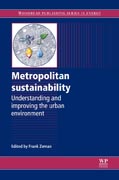
Metropolitan sustainability: understanding and improving the urban environment
Zeman, Frank
Global populations have grown rapidly in recent decades, leading to ever-increasing demands for shelter, resources, energy and utilities. Coupled with the worldwide need to achieve lower impact buildings and conservation of resources, the need to achieve sustainability in urban environments has never been moreacute. Metropolitan sustainability critically reviews the fundamental issues and applied science, engineering and technology that will enable all cities toachieve a greater level of metropolitan sustainability, and assist nations inmeeting the needs of their growing urban populations.Part one introduces key issues related to metropolitan sustainability, including the use of both urban metabolism and benefit cost analysis. Part two focuses on urban land use and the environmental impact of the built environment. The urban heat island effect, redevelopment of brownfield sites and urban agriculture are discussed in depth, before part three goes on to explore urban air pollution and emissions control. Urban water resources, reuse and management isexplored in part four, followed by a study of urban energy supply and management in part five. Solar, wind and bio energy, the role of waste-to-energy systems in the urban infrastructure, and smart energy for cities are investigated.Finally, part six considers sustainable urban development, transport and planning ÍNDICE: Part 1 Metropolitan sustainability: An introduction: A living city: Using urban metabolism analysis to view cities as life forms; Benefit cost analysis for environmental decision making: Using discounting to compare benefits and costs that occur at different points in time; Quantifying sustainability: industrial ecology, materials flow and life cycle analysis; Separation of mixtures: fundamentals and technologies. Part 2 Earth: Urban land use and the environmental impact of the built environment: The urban heat island effect: causes and potential solutions; Redevelopment of brownfield sites; Urban agriculture: Opportunities and constraints; Building-integrated agriculture: a new approach to food production. Part 3 Wind: Urban air pollution and emissions control: Metropolitan effects on atmospheric patterns: Important scales; The science of smog: a chemical understanding of ground level ozone and fine particulate matter; Air pollution in the urban atmosphere: Sources and consequences; Controlling emissions of pollutants in urban areas; Passive systems to improve air quality and reduce heat retention in the urban environment. Part 4 Water: Urban water resources, reuse and management: Integrated urban water management: Water use and reuse; Rainwater harvesting: using urban roof runoff for residential toilet flushing; Urban water supply: Modelling watersheds and treatment facilities; Water and wastewater treatment: chemical processes; Water and wastewater treatment: biological processes. Part 5 Fire: Urban energy supply and management: Solar energy in the built environment: Powering the sustainable city; Wind energy in the built environment; The role of waste-to-energy in the urban infrastructure; Smart energy for cities: decentralized supply resources andtheir link to the modern grid; Bioenergy for the urban environment. Part 6 Sustainable urban development, transport and planning: Planning for more sustainable urban development; Sustainable urban transport planning; The psychological needs of city dwellers: Implications for sustainable urban planning; Possible future approaches to sustainable building design; Moving toward urban sustainability: Using lessons and legacies of the past; A vision of suburban sustainability: The Long Island Radically Rezoned project.
- ISBN: 978-0-85709-046-1
- Editorial: Woodhead
- Encuadernacion: Cartoné
- Páginas: 768
- Fecha Publicación: 01/10/2012
- Nº Volúmenes: 1
- Idioma: Inglés
